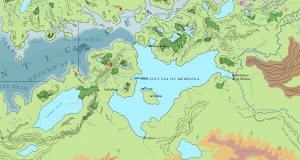Difference between revisions of "Drameggin"
Trismegistus (talk | contribs) m |
Trismegistus (talk | contribs) m |
||
| Line 1: | Line 1: | ||
[[File:MapAntediluvianSeaofMemnosia.jpg|thumb|300px|Map of Magdeologers' Re-creation of the ancientSea of Memnosia around 12,000 [[AS]] which is before the [[Flood of Aturyanda]]. Sites of ancient cities according to Kalaman and Shelekhumbian Myth are shown. The [[antediluvian]] Sea of Memnosia, in contrast to the modern [[Memnosian Sea]], had no outlet to the ocean and was entirely land-locked.]] | [[File:MapAntediluvianSeaofMemnosia.jpg|thumb|300px|Map of Magdeologers' Re-creation of the ancientSea of Memnosia around 12,000 [[AS]] which is before the [[Flood of Aturyanda]]. Sites of ancient cities according to Kalaman and Shelekhumbian Myth are shown. The [[antediluvian]] Sea of Memnosia, in contrast to the modern [[Memnosian Sea]], had no outlet to the ocean and was entirely land-locked.]] | ||
| − | Drameggin (DRA-meggin) is the Midretassene name for an [[antediluvian]] civilization thought to have existed in the region of the [[Memnosian Sea]]. Drameggin Civilization is the name given to the putative cultures that existed in this region before its coasts and islands succumbed to the flood. These cultures were not part of a single state, but probably gave | + | Drameggin (DRA-meggin) is the Midretassene name for an [[antediluvian]] civilization thought to have existed in the region of the [[Memnosian Sea]]. Drameggin Civilization is the name given to the putative cultures that existed in this region before its coasts and islands succumbed to the flood. These cultures were not part of a single state, but probably gave some sort of obeisance to the [[Aarokinian Titans]] who held sway over Asdar before the [[Flood of Aturyanda]]. Some scholars believe many of the cities of the Drameggin Civilization rest to this day in the depths of the Memnosian Sea, such as [[Kathyasundi]], a place-name given in the [[Aturyandakumi]]. [[Autochthonist]]s say that it is likely a powerful race of common giants ruled this region of the world with human tribes as subject tributaries. |
Drameggin Civilization is about fifteen thousand years or more old. For this reason, artifacts from this time are extremely rare and are usually made of heavy, colossal stone. Scholars today believe that the [[Jathya-Dhumi]] peoples and languages were roughly coterminous with Drameggin Civilization. | Drameggin Civilization is about fifteen thousand years or more old. For this reason, artifacts from this time are extremely rare and are usually made of heavy, colossal stone. Scholars today believe that the [[Jathya-Dhumi]] peoples and languages were roughly coterminous with Drameggin Civilization. | ||
| Line 10: | Line 10: | ||
{{Main|Sea of Memnosia}} | {{Main|Sea of Memnosia}} | ||
{{See also|Memnosian Sea}} | {{See also|Memnosian Sea}} | ||
| − | Before the [[Flood of Aturyanda]], [[Magdeology|Magdeologer]]s' believe that the [[Memnosian Sea]] was entirely land-locked. The land-locked body of water is called the [[Sea of Memnosia]] to distinguish it from the modern sea which is today part of the greater ocean and has access to the [[Pallathantic Sea]] and the [[Strait of Ummak]]. | + | Before the [[Flood of Aturyanda]], [[Magdeology|Magdeologer]]s' believe that the [[Memnosian Sea]] was entirely land-locked. The land-locked body of water is called the [[Sea of Memnosia]] to distinguish it from the modern sea which is today part of the greater ocean and has access to the [[Pallathantic Sea]] and the [[Strait of Ummak]]. The Sea of Memnosia rested at the heart of the Drameggin Civilization. |
=See Also= | =See Also= | ||
Revision as of 13:35, 17 September 2017

Drameggin (DRA-meggin) is the Midretassene name for an antediluvian civilization thought to have existed in the region of the Memnosian Sea. Drameggin Civilization is the name given to the putative cultures that existed in this region before its coasts and islands succumbed to the flood. These cultures were not part of a single state, but probably gave some sort of obeisance to the Aarokinian Titans who held sway over Asdar before the Flood of Aturyanda. Some scholars believe many of the cities of the Drameggin Civilization rest to this day in the depths of the Memnosian Sea, such as Kathyasundi, a place-name given in the Aturyandakumi. Autochthonists say that it is likely a powerful race of common giants ruled this region of the world with human tribes as subject tributaries.
Drameggin Civilization is about fifteen thousand years or more old. For this reason, artifacts from this time are extremely rare and are usually made of heavy, colossal stone. Scholars today believe that the Jathya-Dhumi peoples and languages were roughly coterminous with Drameggin Civilization.
Legends of the later Kalama civilization give fantastic accounts of a race of sorcerers called the Hezzoumet who transformed beasts and men into therianthropes and who gated in beings from other realms.
Sea of Memnosia
Before the Flood of Aturyanda, Magdeologers' believe that the Memnosian Sea was entirely land-locked. The land-locked body of water is called the Sea of Memnosia to distinguish it from the modern sea which is today part of the greater ocean and has access to the Pallathantic Sea and the Strait of Ummak. The Sea of Memnosia rested at the heart of the Drameggin Civilization.
See Also
- Aturyandakumi
- Hezzoumet Sorcerers
- Kathyasundi, the ancient city of King Aturyanda
| This article is a stub. It requires further development by the creator. |